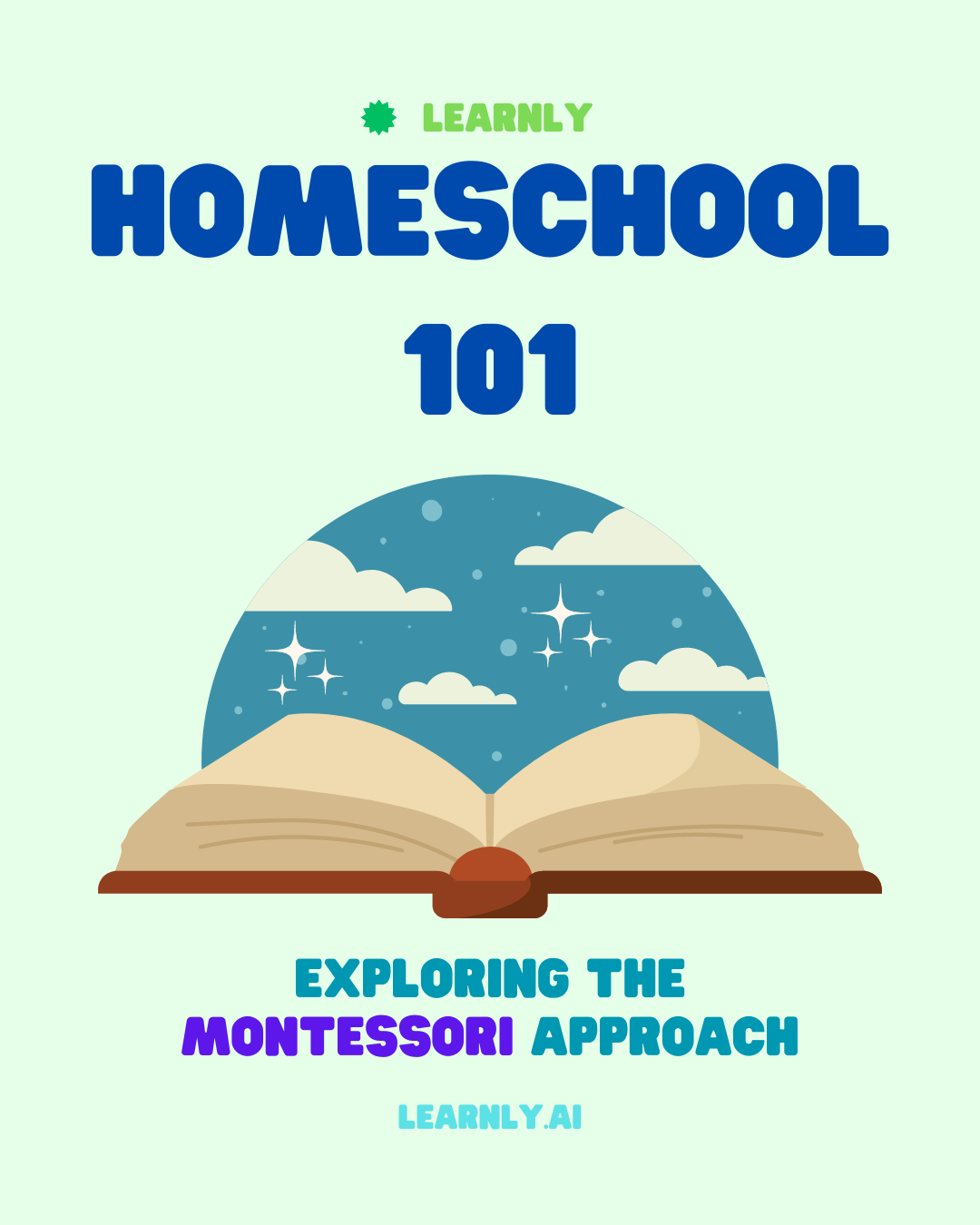Introduction to the Montessori Approach to Homeschooling
Welcome to the exciting world of homeschooling!
Homeschooling has gained immense popularity over the years.
Parents opting to take control of their children's education and provide a customized learning experience tailored to their child's needs.
One of the most renowned and highly regarded homeschooling approaches is the Montessori Approach.
Developed by Maria Montessori over a century ago, this approach is focused on the child's natural development.
It encourages self-directed learning through hands-on activities and exploration.
In this article, we will explore the Montessori Approach to Homeschooling in detail, discussing what it is, who should use it, why it's an excellent option for your child's education, and how to implement it successfully in your homeschooling environment.
Suppose you're looking for a unique, child-centered approach to homeschooling that emphasizes independence, creativity, and critical thinking skills.
In that case, the Montessori Approach may be perfect for you and your family.
So, let's dive in and explore the Montessori Approach to Homeschooling together!
What is the Montessori Approach to Homeschooling?
The Montessori Approach to Homeschooling is a child-centered educational philosophy emphasizing independence, hands-on learning, and self-directed exploration.
Developed by Italian physician and educator Maria Montessori in the early 1900s, this approach is grounded in the belief that children learn best when free to explore their interests and learn at their own pace.
The Montessori Approach is unique in its use of specially designed materials to facilitate learning.
These materials are designed to be self-correcting, meaning children can identify and correct their mistakes, promoting independence and self-confidence.
Additionally, the Montessori Approach focuses on creating a prepared environment that is safe, aesthetically pleasing, and organized to facilitate learning and exploration.
One of the core principles of the Montessori Approach to Homeschooling is that children learn best through experience.
Therefore, the approach places a strong emphasis on hands-on learning and exploration.
This means that children are encouraged to manipulate objects, engage in sensory experiences, and engage in practical life activities such as cooking, cleaning, and caring for plants and animals.
The Montessori Approach to Homeschooling also emphasizes developing social skills and emotional intelligence.
The approach encourages children to work collaboratively, respect each other's differences, and grow empathy and compassion for others.
This focus on social and emotional development is critical for preparing children to succeed in the world beyond the classroom.
In summary, the Montessori Approach to Homeschooling is a unique, child-centered approach to education that emphasizes hands-on learning, independence, and social and emotional development.
This approach is grounded in the belief that children learn best when they are given the freedom to explore their interests and learn at their own pace.
It is highly effective in preparing children for success in both academic and social settings.
Imagine you're looking for a homeschooling approach that is both highly effective and highly engaging for your child.
In that case, the Montessori Approach may be just what you're looking for.
Who Should Use the Montessori Approach to Homeschooling?
The Montessori Approach to Homeschooling is ideal for parents who want their child to develop critical thinking skills, creativity, and independence.
This approach is highly effective for naturally curious children who enjoy hands-on activities and desire to explore and discover new things.
Highly self-motivated children who enjoy working independently will also thrive in a Montessori homeschooling environment.
Children with sensory processing issues, attention deficit disorder (ADD), or hyperactivity may benefit significantly from the Montessori Approach to Homeschooling.
This approach provides a structured yet flexible learning environment tailored to each child's needs.
The hands-on activities and self-directed learning opportunities can help children with ADD or hyperactivity stay focused and engaged in their learning.
Montessori homeschooling can be an excellent fit for families prioritizing environmental sustainability and natural living.
This approach encourages children to engage with nature and learn about the environment through hands-on activities such as gardening, composting and caring for animals.
It also strongly emphasizes using natural and eco-friendly materials in the learning environment.
Families who value creativity and self-expression will also appreciate the Montessori Approach to Homeschooling.
This approach encourages children to explore their interests and express themselves through various mediums, including art, music, and writing.
The focus on hands-on learning and exploration allows children to discover and pursue their passions in a meaningful way.
Finally, the Montessori Approach to Homeschooling is an excellent choice for families who want to provide their child with a personalized and individualized learning experience.
This approach allows children to learn at their own pace and according to their interests, ensuring that each child's unique learning style and needs are met.
Additionally, the one-on-one attention provided in a homeschooling environment allows for a more in-depth exploration of topics and a deeper understanding of concepts.
Why Choose the Montessori Approach to Homeschooling?
The Montessori Approach to Homeschooling is a highly effective way to provide children with a well-rounded and comprehensive education that fosters independence, creativity, and critical thinking skills.
This approach provides a hands-on, experiential learning environment that encourages children to explore their interests and passions.
It also strongly emphasizes social and emotional development, ensuring that children are prepared to succeed academically and in their personal and professional lives.
Another reason to choose the Montessori Approach to Homeschooling is its flexibility and adaptability.
This approach is tailored to meet each child's unique needs and learning styles, ensuring that they receive the support and guidance they need to thrive academically and personally.
Whether your child is a visual, kinesthetic, or auditory learner, the Montessori Approach can be customized to meet their individual needs.
The Montessori Approach to Homeschooling is also highly engaging and motivating for children.
This approach encourages children to take ownership of their learning, making it a fun and empowering experience.
The hands-on learning activities and self-directed exploration foster a love of learning that can last a lifetime.
In addition, the Montessori Approach emphasizes the importance of creativity and self-expression, providing children with opportunities to explore their interests and pursue their passions.
For families who are concerned about the socialization aspect of homeschooling, the Montessori Approach provides a solution.
This approach deeply emphasizes social and emotional development, encouraging children to work collaboratively, respect each other's differences, and develop empathy and compassion for others.
This focus on socialization ensures that children are well-prepared to interact with others and succeed in their personal and professional lives.
Finally, the Montessori Approach to Homeschooling is highly practical in preparing children for success in higher education and beyond.
This approach emphasizes developing critical thinking skills, problem-solving abilities, and creativity, providing children with a solid foundation for academic and career success.
In addition, the independence and self-directed learning skills developed through the Montessori Approach also prepare children to be self-motivated and self-directed learners throughout their lives.
How to Use the Montessori Approach to Homeschooling
The first step in using the Montessori Approach to Homeschooling is creating a prepared learning environment.
This means setting up a designated space for learning that is organized, clean, and free from distractions.
The environment should also be filled with hands-on learning materials that are developmentally appropriate for your child's age and learning level.
The Montessori Approach to Homeschooling emphasizes self-directed learning, so giving your child the freedom to choose the activities they want to work on is essential.
However, it is also vital to provide guidance and support as needed.
Please encourage your child to ask questions and explore their interests, but also be available to offer assistance and answer questions as needed.
Another critical aspect of the Montessori Approach to Homeschooling is using multi-age groupings.
This means children of different ages and learning levels work together in the same learning environment.
This approach encourages collaboration, peer mentoring, and the development of social skills.
Therefore, it is important to structure the learning environment in a way that allows for multi-age groupings, such as by setting up appropriate learning stations for different age levels.
In addition to hands-on learning materials, the Montessori Approach to Homeschooling also strongly emphasizes real-world experiences.
This means providing opportunities for your child to learn through practical, hands-on experiences, such as cooking, gardening, and caring for animals.
These experiences help children develop necessary life skills and can also reinforce academic concepts in a meaningful way.
Finally, providing your child with opportunities for unstructured play and exploration is important.
The Montessori Approach emphasizes the importance of free play for children to develop their creativity, imagination, and social skills.
Encourage your child to engage in imaginative play, explore the outdoors, and pursue their interests self-directedly.
By providing a balance of structured and unstructured learning opportunities, you can help your child develop a love of learning that will last a lifetime.
Conclusion
In conclusion, the Montessori Approach to Homeschooling is an effective and rewarding way to provide children with a comprehensive education that fosters independence, creativity, and critical thinking skills.
This approach firmly emphasizes hands-on, experiential learning, social and emotional development, and self-directed exploration.
It is a highly adaptable approach that can be tailored to meet each child's unique necessities and learning styles.
Using the Montessori Approach to Homeschooling, parents can provide their children with a well-rounded education that prepares them for higher education and beyond success.
This approach helps children develop the skills they need to be self-directed learners, critical thinkers, and problem solvers.
It also emphasizes the importance of socialization and encourages children to develop empathy, respect for others, and collaboration skills.
To use the Montessori Approach to Homeschooling, parents should create a prepared environment conducive to learning, encourage self-directed exploration, structure the learning environment to allow for multi-age groupings, provide opportunities for hands-on experiences and unstructured play, and offer guidance and support as needed.
Overall, the Montessori Approach to Homeschooling is a valuable tool for parents who want to provide their children with a personalized, comprehensive education that prepares them for success in all areas of their lives.
By employing this approach, parents can help their children develop a lifelong love of learning and set them on a path to success.
Resources & Tools
- The Montessori Method: The Origins of an Educational Innovation by Maria Montessori
- The Montessori Toddler: A Parent's Guide to Raising a Curious and Responsible Human Being by Simone Davies
- Montessori from the Start: The Child at Home, from Birth to Age Three by Paula Polk Lillard and Lynn Lillard Jessen
- Montessori: A Modern Approach by Paula Polk Lillard
- The Montessori Method: Scientific Pedagogy as Applied to Child Education in "The Children's Houses" with Additions and Revisions by Maria Montessori
- The Absorbent Mind by Maria Montessori
- Montessori Services - an online store that provides a wide variety of Montessori materials, including books, educational toys, and classroom supplies.
- The American Montessori Society - an organization that provides information and resources on the Montessori approach to education, including a directory of Montessori schools and teacher training programs.
- The Montessori Foundation - an organization that offers training, support, and resources for Montessori schools and homeschooling families.
- The Montessori Homeschooling Summit - an online event that brings together Montessori experts and homeschooling families to share knowledge and resources on the Montessori approach to homeschooling.
/>





